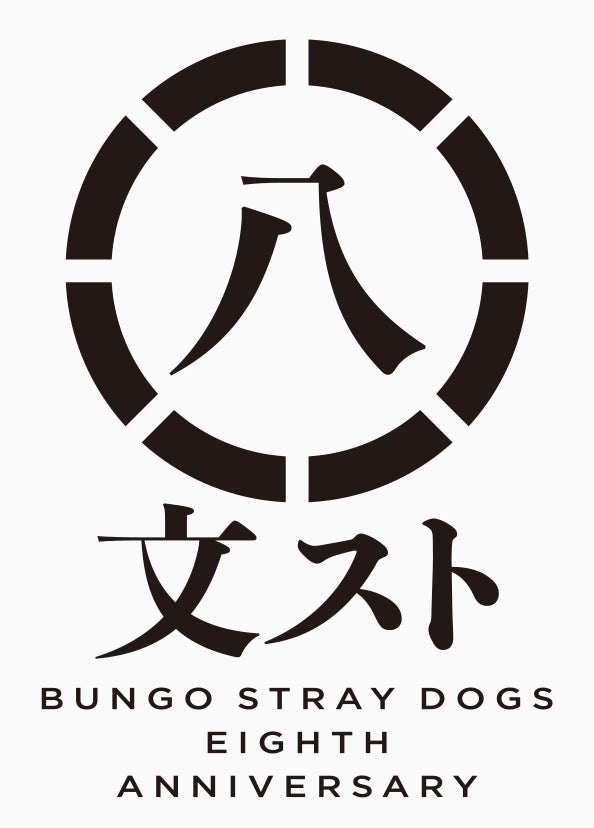In the age of social media, the reaction from fans overseas comes directly to the creators in Japan. There is one anime studio that has a surprising 460,000 followers on Twitter.
That studio is MAPPA.
MAPPA is behind many series that have been tremendously popular overseas. They keep delivering hits, including Attack on Titan: The Final Season, Jujutsu Kaisen, and Yuri!!! on ICE, and have been growing quickly.
Why have they been able to keep on making anime that is immensely popular both within Japan and overseas?
We sat down with MAPPA's president, Manabu Otsuka, MAPPA animator/director Tadashi Hiramatsu, and executive director Makoto Kimura for an interview.
▲From left to right – Tadashi Hiramatsu, Manabu Otsuka, and Makoto Kimura
Profiles
Manabu Otsuka
Manabu Otsuka is the CEO of MAPPA. He’s also been the president since April 2016. To this day, he remains involved in every MAPPA project.
Tadashi Hiramatsu
Tadashi Hiramatsu is an animator/director who works exclusively for MAPPA. He worked on MAPPA’s Yuri!!! on ICE as the character designer/an animator/chief animation director, and joined MAPPA as an employee in 2018. Recently, he’s been involved with Jujutsu Kaisen as the character designer.
Makoto Kimura
Makoto Kimura is the executive director/general manager of the planning department. He was previously a producer on Terror in Resonance, a show that aired on Fuji Television's Noitamina block. He joined MAPPA in 2018 when the studio was starting to garner praise. He’s currently a producer and in charge of new business development/project sales.
Previous “The Present and Future of Anime Studios” Articles
MAPPA’s Consecutive Turning Points
ーーThank you for taking the time to speak with me today. It seems like it has been a while since we’ve met in person.
Hiramatsu: I've been working from home a lot since the pandemic. Of course, that means I haven't met the president for a while, but I also haven’t seen Kimura recently either (laughs).
Kimura: That's right. I've met with Otsuka a few times, though.
Otsuka: Remotely and such.
Hiramatsu: I feel lonely since we haven’t been meeting in person as much.
ーーI see. How has your company adapted to working remotely?
Otsuka: It depends on the department. The animators and in-betweeners have been working from home as much as possible. The CGI, 3D, and background animators have adapted quickly. The company provides the equipment, and then they can work from home. It's been difficult for production, though. Making anime is a team effort, so some things can only be done when everyone gets together in the same place, especially before the episode is about to air.
ーーEvery company has been having trouble under these circumstances.
Hiramatsu: Character designs, storyboards and other parts of the preproduction process can be done at home. However, once things get going, the number of people involved increases, and there are things that can only be done in the office, especially in regards to directing. I've heard that one of the merits of switching to online meetings is that they are shorter overall, but in our business, ideas blossom from discussion. It’s not good that the place for discussion has disappeared. Good things come from meeting in person.
ーーThat is quite the problem… The main reason that I've come to speak with you today is that MAPPA has been involved with numerous hit titles. Has anything changed in the studio in response to these big hits?
Otsuka: Basically, the way we merchandise has changed. Yuri!!! on ICE (referred to as Yuri below) raised our awareness of this opportunity to increase our business, and now we are focusing on maximizing our potential. Also, the number of female staff increased after Yuri became a hit.
Hiramatsu: A while ago, I had a female fan come up to me when I was at my usual izakaya (Japanese-style bar).
Kimura: Female staff members are active on the creative side and production side.
ーーIt may be that having a massive hit created an opportunity for people to gather at your studio.
Hiramatsu: It’s important to be alert and not let the chance that having a hit creates pass by.
Otsuka: It’s said that having a hit captures the spirit of the era, and I can feel that it’s actually “the forefront of the generation.” I think the experiences from a hit anime are reflected in the next project.
ーーHave you been able to gather talented staff thanks to your massive success?
Otsuka: Rather than the projects that were hits, it’s because we work on a lot of different titles that people start to think “If I join MAPPA, they might let me work on this anime." That is the most significant influence. When new graduates enter our company, these young people may say that they watched Jujutsu Kaisen.
Hiramatsu: When you gain experience as an animator, you start to have a clear vision of what kind of anime you would like to make and what you want to draw, which is a crucial desire to have, but not all you need to continue for a long time.
Those who have realized their talent can self-actualize what it is they want to do with anime. The ones who wish to have anime in their lives are the ones who keep working and achieve success.
Of course it’s important to like what you’re doing, wanting to draw certain things, wanting to work on specific projects, but if that's everything then what is the difference between the animators and the fans? If you're not more passionate than the fans, then it's difficult to continue working.
ーーWhen you talk about continuing to work for a long time, you're talking about yourself, aren't you Hiramatsu-san?
Hiramatsu: I’ve been working for around 37 years, and there were five or six people who started at the same time as me. However, now there is only one person whose name is still appearing in credits. There are probably a few others from my generation who are still kicking around, though.
ーーSpeaking of hits, one series that has recently been successful is Jujutsu Kaisen. Has that series becoming a hit caused any changes?
Otsuka: Not only Jujutsu Kaisen, but Attack on Titan was a popular title that also garnered a lot of attention both in Japan and overseas as well. Our Twitter follower count exploded, and we couldn't help but wonder what happened to cause such an increase (laughs).
Hiramatsu: I felt like some kind of mysterious power was in action (laughs).
Kimura: Before Jujutsu Kaisen started airing, we had under 100,000 followers, so I thought if we kept trying, we could reach 100,000, but now (at the time of this interview), we’re at 450,000 followers.
Hiramatsu: This was very clear with Yuri. Before it started airing, I saw people reacting like, "how is a skating anime going to turn out," but once it started airing, there was a big reaction from overseas, with Japan reacting a bit later. I was surprised about that.
Otsuka: In regards to Jujutsu Kaisen, it was able to smoothly incorporate the latest trends in anime, which was huge. That’s what happens every time in this world.
Kimura: We regularly hold MAPPA SHOW CASE, an exhibition where all of our projects are displayed, and people have been turning out thanks to the strength of the titles. We're thinking about proactively holding exhibitions outside of special events. If we can make those arrangements, we can tie the anime and the studio together and perhaps increase the number of fans.
Hiramatsu: The way that Japan and overseas understand our projects is different. Don’t Japanese people usually look at the cast and staff? They choose what they watch based on the director or cast members.
Overseas though, to use the MCU (Marvel Cinematic Universe) or DC as an example, they create a massive genre, and people go and see those movies. Disney and Pixar are the same in that historically the studio has been the main draw, so we must pay attention to this point from now on.
ーーSo, would you say that MAPPA’s turning point was Yuri!!! on ICE?
Otsuka: Well, we’ve had a lot of turning points (laughs). There was no work between our first anime, Kids on the Slope, to Terror in Resonance, Rage of Bahamut: Genesis, and Garo: The Animation that were all made at once in 2014. After that, we've been able to work consistently.
After that, Yuri and In This Corner of the World were our first hits. With the experience of our work being universally praised under our belt, we took on the challenge of Zombie Land Saga and other works.
Recently, we’ve added Jujutsu Kaisen and Attack on Titan to our lineup, so we'll be able to take this experience, and I feel we'll look back on it as one of our turning points.
ーーThere usually aren’t that many turning points, so what was the reason that you had so many?
Otsuka: First of all, we just try and create, and hope to continue providing viewers with anime. If I only think about our pace and what suits us, then that means we have to pick up the pace.
Also, I think we had good luck. We had good momentum when moving to the next step.
Hiramatsu: When going to the next step, we went from saying “we were lucky” to “we have to summon our luck.”
Otsuka: That’s true.
Hiramatsu: When Yuri became a hit, we thought that we had to change what we were aware of.
Otsuka: Yuri connected to Zombie Land Saga and Banana Fish, which led to Jujutsu Kaisen.
Kimura: When we worked together on a Fuji Television project, I was impressed with MAPPA’s quality as an outsider.
ーーOf course, a television station would want to request you after seeing such beautiful work.
Kimura: That’s right. Terror in Resonance was the first work I did with MAPPA, and from that point on, I thought that we could regularly work together. Even now, we've continued relationships with many different companies, which has led to us being able to accumulate a lot of work.
The Importance of Speed
ーーTell me the basics and important points of creating a MAPPA title.
Otsuka: We don’t have any rules about how to make something a hit. However, there is something that is a must – at the very least, the quality must be high.
Another point is that, for example, if Hiramatsu-san is working on something, then we need to draw his highest quality work out. I would say that this is our biggest battle.
Also if the staff gets along, or if they can’t get back on track after having some bad luck, that’s linked to a successful result. If the staff doesn’t get along, then they lose their motivation. We’ve never had this situation result in a hit. Teams that keep their motivation high and focus on delivering a quality project up until the end will create a hit.
Hiramatsu: This includes the person in charge of maintaining the flow of production. If they don’t mind doing the impossible, both good and bad (laughs), then they can create good relationships, and the work will go smoothly.
Kimura: Overthinking things has many different outcomes, so we should try our best to do what we can. It’s important to make decisions based on what doing this work now may lead to in the future.
Hiramatsu: From a marketing perspective, if you say that the original sold X number of copies, it doesn't necessarily mean that the anime will go smoothly.
Also, if those who animate and produce the work don’t enjoy the original story, then they are not going to be able to put their heart into their work, which audiences will quickly notice. Teams that are working hard without forcing themselves tend to do well, I believe.
Otsuka: When we got Jujutsu Kaisen, it was popular but not to the extent that it is today.
Kimura: When you ask “who is going to make the anime?”, lots of weird hurdles come up.
(laughs)
ーーWell then, what would you say is MAPPA’s strong point?
Otsuka: We can decide things quickly. In general, if I approve, then it goes through, and I think that level of freedom and speed is what works. Of course, there are always details that need to be worked out. However, if we want to, for example, make a studio in Sendai, then we go ahead and do just that.
Hiramatsu: I was a freelancer for a long time, so I didn’t really consider each company's good or bad points. However, MAPPA is stress-free. I haven’t encountered anything boring yet.
Otsuka: If we get bigger, we might become a stricter company (laughs).
(laughs)
Hiramatsu: (laughs) Our strength is that we have a laid-back work environment so that our staff can do what they want.
Kimura: Personally, I appreciate that the president's decisions always come quickly. If it's too slow, then that's going to lead to a lot of problems. Also, from a business perspective, one of our strengths is that we have many titles. When we started selling our programs and holding events, there were a lot of things that we could do, thanks to the number of titles we had. That has been something that helped us with business development and reliably creating anime.
ーーIf I hear what you’re saying, the president’s greatest ability is his speed.
Otsuka: The staff members who are doing the main work are in their twenties, so they’re always ready to hit the accelerator (laughs). I think that’s a good thing.
ーーWhat is a significant difference between MAPPA and other studios?
Otsuka: I think a difference is that we have a higher number of production lines. Thus, our strength isn’t dispersed, but rather we make our anime as a team, which is our specialty.
ーーThe production line has steadily been increasing, hasn’t it?
Otsuka: That's right. It used to be only one line, but in 2014 it was two, which increased to three. MAPPA’s policy was "we want to grow quickly." It usually takes twenty to twenty-five years to find something to improve on, but I wanted to quickly create a space where the workers can bring their hopes with them. I understand that failure comes with rushing, but I thought that anime wouldn't flourish if I didn't make it. That's why I made a system where we can continue to grow.
Hiramatsu: No matter how much of an idealized form you create, if you can't plan then there's no meaning to it. At first, you can only imagine your ideal, which is so far from reality. However, as you plan, you can chase after your ideal, and with that, it becomes even greater. Therefore, it's important to keep on adding to your goal.
Otsuka: That’s because a lot of young people work at MAPPA.
Hiramatsu: Each studio had its own creation system, so I don't know what would be considered "correct." What's good about MAPPA's system might be regarded as bad by other studios. There are some points where I think it might be better if we trimmed the fat (laughs), but in the end, those may be our strong points.
ーーI see. Could each one of you tell me what you like about working (at MAPPA?)
Otsuka: Objectively, the struggles and dissatisfaction I experienced in my twenties has been solved here. There are many chances for workers to move up in the company. If you work hard, we have an environment where you can create to your highest abilities. If everyone thinks that's "good," then I'm happy.
Hiramatsu: Personally, I like that I can feel at ease when I work, but I don’t know if the younger staff feels the same way. I almost have the most seniority…wait, do I have the most seniority?
Otsuka: The chairman has the most seniority.
Hiramatsu: Well, I don’t really know what the workers in the studio feel like, so maybe I just feel at ease because there’s no one above me. (laughs) Everyone works hard, so I don’t even have to say "keep at it," so I feel pretty relaxed. I can just say whatever, and I don't feel any pressure.
Kimura: When you’re working in an environment that involves anime, the environment is always bustling and changing day by day. Our studio has the speed necessary to take on a lot of new challenges, which I find very fun. I get to add to my achievements while having new experiences through daily reflection and discovery, so that is what I like about working at MAPPA.
Making Anime Under Pressure
ーーWe will be translating this interview so it reaches audiences overseas. So I want to ask, what does MAPPA keep in mind when aiming to bring their work overseas?
Otsuka: I’ve talked about what we should keep in mind when creating before, but overseas audiences and Japanese audiences enjoy the same things. In terms of business, the overseas market has become huge in recent years, and when we decided to add staff from overseas, we hired them just as we would hire Japanese staff. We have an environment where people from many different countries are making Japanese anime at MAPPA.
MAPPA now has a network of animators throughout the world, which is something we’ve been able to establish pretty quickly. Actually, we’ve been able to utilize our international staff’s language skills through translation as well.
Kimura: When we would sell our programs overseas long ago, we would have to go in-person to have discussions, but now we can smoothly do everything through video calls. We can still be in Japan and directly exchange opinions.
We can quickly and directly hear the voices of overseas fans and meet their business needs, so I’m hoping for the day we can jump in and do something with that.
For example, the COVID-19 situation has made things more complicated, not only with selling programs overseas. So, I want to think of a new way that people can enjoy our events and products.
Hiramatsu: When I was brought to an event overseas, I thought, "I wonder what it is that overseas fans want from Japanese anime?"
I thought they wanted Japanese animation because it was different from American or European animation, so if we made something that matched the massive demands of the American or Chinese market, then Japanese animation would be over.
We can only create what we do in Japan, so we don't need to consider what overseas audiences think. Of all the people who think our work is interesting, if someone notices that "This is something that the Japanese studio MAPPA did," then that's enough for me. We only make what we want to, and if people want what we make, then I think that's great.
Kimura: Of our past works, The God of High School was requested by an overseas company, and Mr Love: Queen's Choice was based on a Chinese game. In addition, our (at the time) upcoming work, Yasuke (currently airing on Netflix), employed a foreign director and was made by a Japanese production team, so there are a variety of ways to create.
Otsuka: What they want is "Japanese anime," right? The American director said so.
Hiramatsu: It’s just like when Toei’s old monster movies went Hollywood. Even if you enjoy that kind of style, the old fans will say, "that's not it" (laughs). In the case of Godzilla, Hideaki Anno (of Evangelion fame) made a pure Japanese-style Godzilla film, and I think that we must do the same. Works are going to keep on being remade, after all.
Of course, we want what we make to garner acclaim. Overseas audiences are free to interpret our work and enjoy it as they like, but I think we have to set a standard.
ーーWhat is MAPPA’s policy or a part of the company culture that you want to protect?
Otsuka: That would be taking on "challenges." Of course, we need to have staff that focuses on doing reliable work. However, we can't lose sight of what makes our projects interesting for the audience. For example, even if we have a specific type of anime that is a hit, we definitely won’t make another series that is just like it. We want to support people who are thinking about what the next generation is looking for.
If I ever stop thinking like this, then we need to switch out the company president. If I ever start to get defensive or act like I'm such a good person, then we must choose a younger president. That's what I've decided.
Hiramatsu: I don't work with the studio at the forefront of my mind. Even going forward, I want to put everything I have into each and every work. I said this earlier, but just smoothly repeating the process isn't good – we need to try and constantly incorporate new methods of expression.
I have a lot of experience, so there was a time I watched some of my old works on a whim, and I thought that they were pretty good. However, I wanted to see if I could do better. There were things that I could only do while I was young, but I've reflected on various things, and I think that I can do things differently now and that I can focus on other areas.
Kimura: Even in terms of the content of the work, I want to keep on exploring new things. There are many things that production has not been able to achieve yet.
On June 27, 2021, there was an event called MAPPA STAGE 2021 -10th Anniversary-, which the producers were in charge of – something that doesn’t happen often. Doing Twitter promotion and the event itself was one thing, but producers themselves were able to put everything together and deliver the finished product. I want to try and proactively approach this kind of project from now on.
ーーI’m sure your policies are part of the reason, but I often hear fans saying that MAPPA’s works are good. Leaving the fact that the works are animated aside, can you tell us the secret?
Otsuka: Hiramatsu-san said that what makes talented creators persevere is the strong will to produce their work in the best way possible.
On the other hand, in terms of group formation, we can still improve on making better animation. Actually, this is one of our explicit goals. If only one of the production lines is good, then that's not enough since the viewers don't know which line did what.
My goal is that all of the production lines are able to deliver high-quality work. I personally feel that we are still behind ufotable and Kyoto Animation, so we need to focus on improving our quality. Of course, each creator has confidence that they can make a beautiful picture…
ーーSo you’re saying that you want to have a higher baseline for quality?
Otsuka:That is correct. Companies need to build up to having truly “powerful” quality. We can’t just leave everything to Hiramatsu-san, so we have a clear task in mind that I think we can meet. We’re now at the stage of doing everything we can to improve.
Hiramatsu: Speaking about individual series, no matter what, episodes 1, 2, and 3 are produced before the series’ first broadcast - for a head start and because they take more time - but with a one-cour series being 13 episodes and a two-cour series being 26 episodes, the quality begins to decline. Even with the decline, we keep pushing forward to our goal, which is a bit different for the animators and the director/producers.
As the character designer and animation director, I will definitely be involved with episode 1, and work on the storyboard with everyone if I can. That means that the quality of episode 1 will be higher, so we’ve raised the bar for the following episodes. If episode 1 were made in the middle of production, then the quality would be low, and there would be complaints, so we can’t do that with the first episode. Sorry to make the presumption that the quality will be lower in the middle, but that inevitably ends up happening, so we should have higher quality at the start.
Also, I wonder what the viewers hold as the standard for "nice animation." I'm very curious about that (laughs). I think there's a gap between what we think and what the fans think.
Otsuka: There is a huge gap.
Hiramatsu: The images from the original work are available, and some think that adjusting the images as much as they can is good, and some don't think so. There are many different viewpoints, but if fans feel that MAPPA works have "good animation," I'm thankful. However, what we consider "good animation" is not the same as the fans, so I feel like we need to express our difference of opinion.
Kimura: I would be grateful if they charitably looked at our work and noticed that it's more complex than they thought (laughs).
Hiramatsu: Some fans say that they don’t want any images from the original manga changed. It may seem like taking art from the original work would lend itself to high quality, but I personally think that it’s better to adjust the original.
It depends on the subject, but it may be better to consider animation as just a single method of expression. Then, people can improve how they interpret animation, and we can improve as well.
ーーDoes MAPPA have anything similar to a future goal?
Otsuka: It’s been almost ten years since we've been founded, so I recently realized that we did indeed move really fast. We just talked about how we've been "attacking rather than defending," which is pretty crazy. It's not as if we've decided that we're going into defense mode, but we want to keep growing as an animation studio, so I’ve recently been feeling like we need to consider where we place our attention.
We have the ability to make anime, so we need to decide what we do carefully. We can’t focus on what other companies are doing, but we’ve been making that kind of turn.
There has been a lot of attention directed at the anime industry these days, so I wonder if that can become one of our strengths? I think we will find out the answer soon.
It was trendy to self-praise and say things like "Japanese anime is amazing," and "We're amazing because we make Japanese anime," but that's cooled down now. What I mean, though, is that I still have high expectations. We can't wait for someone to change us; we have to use our power to make Japanese animation greater than ever.
Hiramatsu: MAPPA now has expectations on us the same as people going from their twenties to thirties. You’re young in your twenties, but things change in your thirties. Each of our works has something unique to it, and each team has a different strength, so we are aiming to be a company that can deliver those strengths to viewers.
ーー Last question – what is a challenge each one of you wants to take on at MAPPA?
Kimura: MAPPA has a lot of different works made by many various creators. I create the teams so the creators can work, so I’d like to continue putting my efforts into that. The result is that we can create anime that fans around the world like, and I’m happy if they can enjoy it.
Hiramatsu: I want to try directing. I’ve directed a short film, but not a long-form work yet, so I want to try that.
Otsuka: I’ve done a lot of things, and I’ve helped many people improve their potential, but I want to put more effort into doing that. I want to help people who work in the anime industry improve. Anime is created as a team, so if we can be a company that helps people in the industry grow, then I think that is an excellent result.
Interviewer – Haruka Ishibashi, Photographer - MoA
MAPPA- Official Twitter account
MAPPA- Official You Tube channel

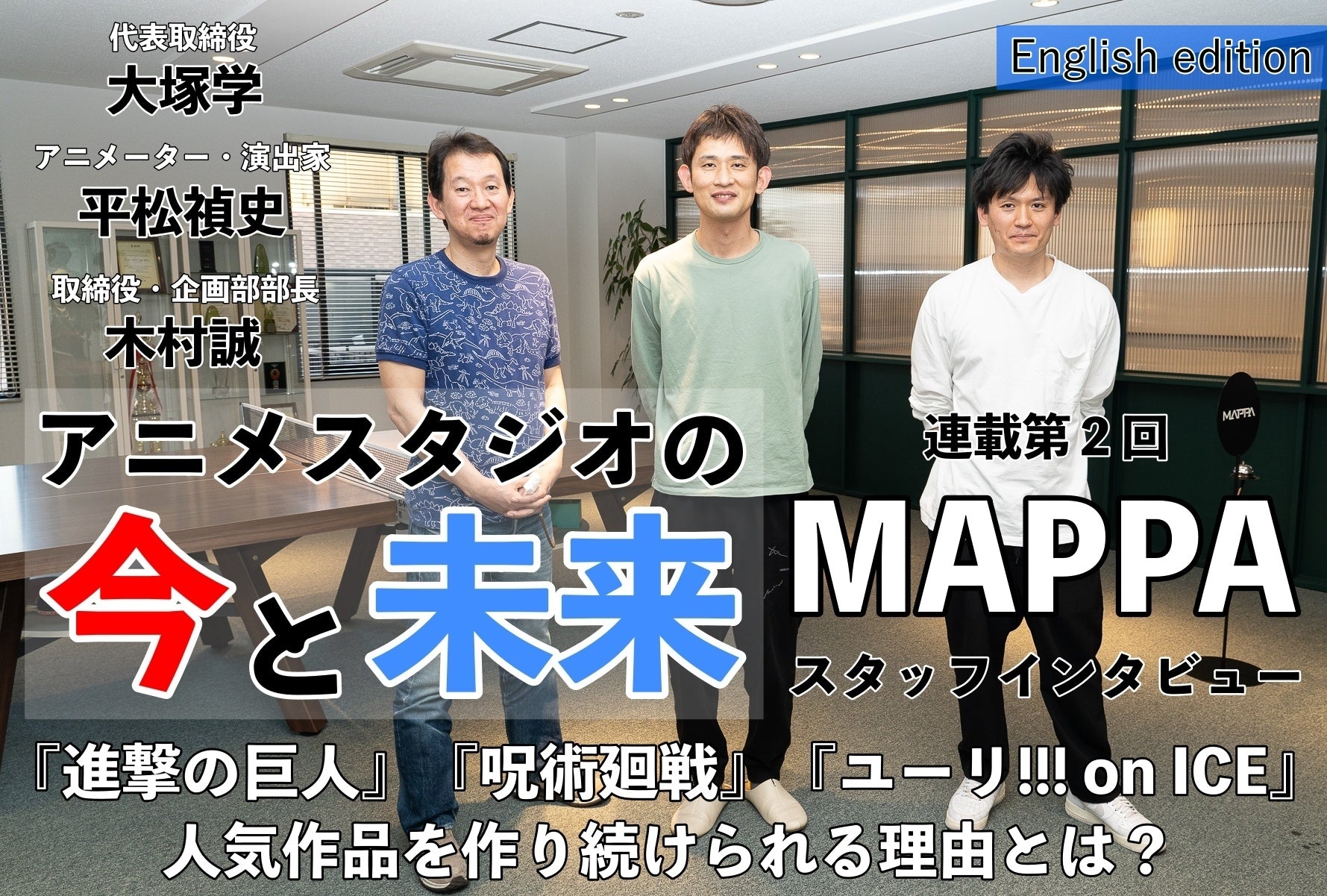
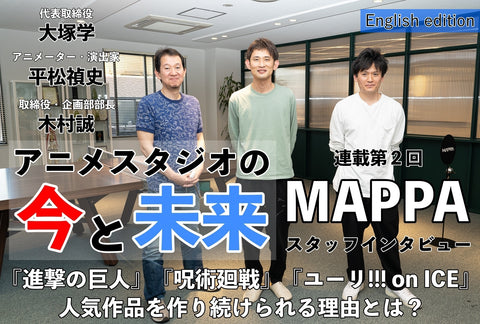


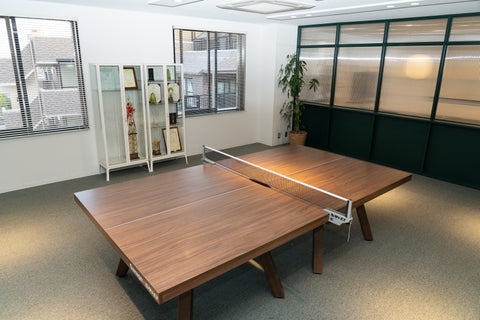




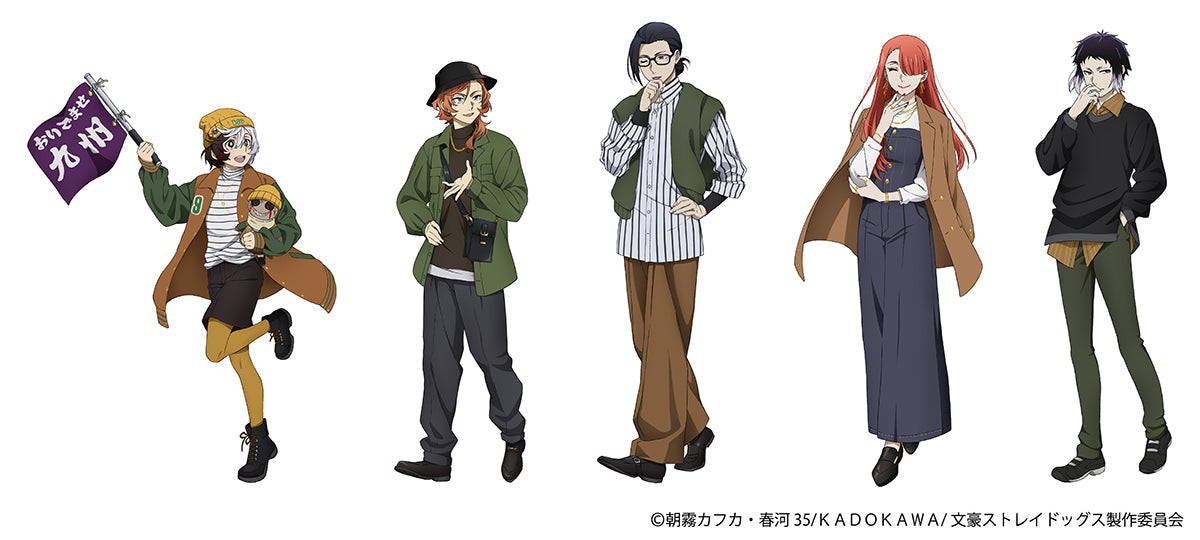
![Do you know who [Tashiro-kun] is ? -on the verge of becoming the next big BL hit-](http://animateusaonlineshop.com/cdn/shop/articles/tashiro.webp?v=1755076774&width=1512)
